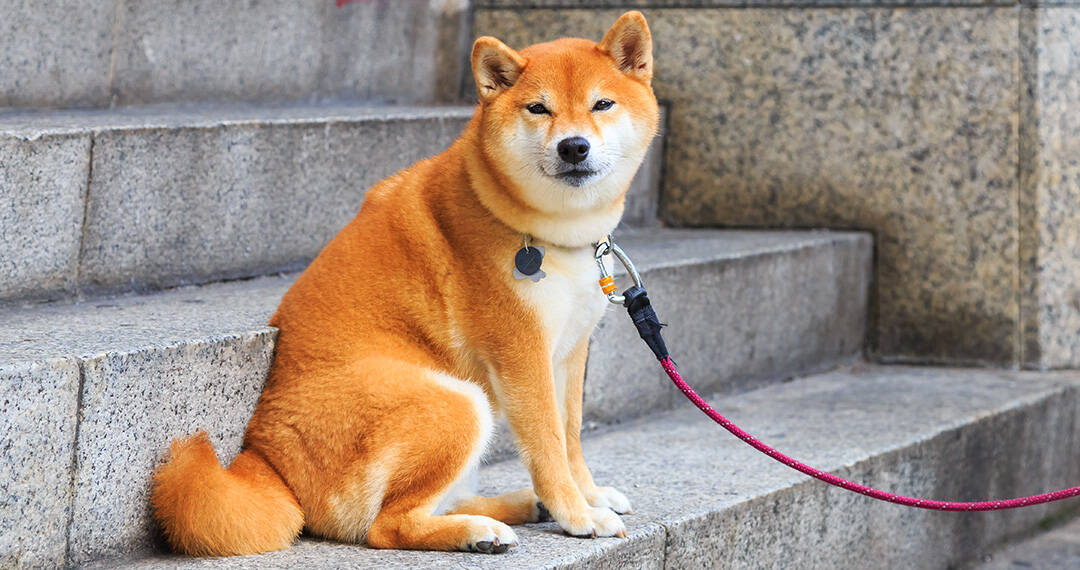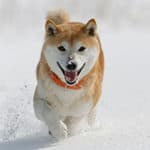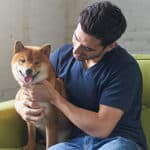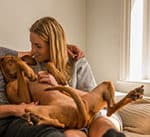The old saying, “Looks can be deceiving,” applies to Shiba Inus perfectly. That sweet, fox-like face appears to be grinning as you gaze at him with wonder and awe. In reality, however, behind that grinning face is a mind that is constantly working on a new scheme to outsmart you.
Well, maybe that is a slight exaggeration, but Shiba Inus are rather famous for their cunning ways and strong-willed personalities. This breed is exceptionally intelligent, courageous, loyal, and complex, though they tend to not care much for excessive affection and sometimes can have aggression issues.
Are Shiba Inus good for first-time owners? Shiba Inus are usually not recommended for first-time dog owners due to their primitive traits. However, it is possible for first-time owners to do very well, provided they thoroughly research the breed and are familiar with common issues that arise.
First-time dog owners who are considering a Shiba Inu are wise to first gain a thorough understanding of the breed and its needs before bringing one of those adorable puppies home.
There are many devoted Shiba Inu owners out there who love their best friends! You might be one of them! As with all things, Knowledge is Power, so keep reading.
The Importance of Socialization
In order to raise a well-adjusted dog that is not only comfortable in various situations but also can be trusted to behave appropriately at all times, socialization is mandatory, especially with Shiba Inus.
What Exactly Is Socialization?
Socialization, simply put, is the process by which you gently acclimate your dog to the world around him by introducing him to as many new sights, sounds, smells, people, animals, and experiences as possible in a positive or neutral way.
Ideally, socialization should begin while a puppy is still with his mother and littermates at the breeder’s home. Responsible breeders will ensure that each puppy is routinely handled and learns to view people as friends.
Puppies undergo a period of rapid mental development between the ages of 2 – 4 months. This is commonly referred to as the socialization window. This critical period is when the majority of socialization activities should take place.
Socialization should be as all-encompassing as possible. Puppies should experience a vast assortment of experiences. Learn even more about socialization with our complete guide to socializing.
Why Is Socialization So Important?
Dogs who have not been properly socialized are often fearful when they encounter anything unfamiliar. This fear may take the form of cowering in the corner whenever a noisy truck drives by but can also result in aggression.
If not introduced in a positive manner to many experiences, dogs will not have the skills necessary to approach any situation confidently and behave in an acceptable manner.
On the other hand, a well-socialized dog is more fun to be around. He looks forward to meeting new people, makes friends with other dogs easily, and can even enjoy shopping trips with you in dog-friendly stores.
The importance of properly socializing your dog cannot be emphasized enough. Do not neglect the critical window of opportunity to correctly socialize and raise a well-adjusted, well-rounded, calm, and friendly dog.
Common Challenges Shiba Inu Owners Will Face
Anyone who is raising a dog is bound to run across issues, notably during puppyhood, but there appear to be breed-specific challenges that commonly arise with Shiba Inus. Let’s take a look at the most common obstacles that owners will face.
Ninja Dogs: Shiba Inus are known escape artists. They love to run free and will go to great lengths to gain freedom. These agile dogs are capable of squeezing through tight places, scaling over and digging under fences, chewing through leashes, darting through open doors, and disappearing through open windows.
Once freedom has been attained, A Shiba Inu seems to vanish into thin air. They will happily run for hours chasing after all manner of furry, little creatures and having the time of their lives, despite your desperate attempts of commanding him to stop.
A Mind of Their Own: Training a Shiba Inu can undeniably be frustrating. This breed has a stubborn streak and a haughty attitude that can be difficult, but not impossible, to overcome. They must be given a reason to want to participate in any training before they will consider it. If they are not convinced that training will directly benefit them in some way, they will often simply refuse and walk away.
Born to Run: Shiba Inus can resort to destructive behavior if not exercised enough every day. This active breed needs at least one long walk or vigorous play period per day, though more is better.
Exercising the body is not enough for the highly intelligent Shiba Inu. Owners must come up with methods and activities that will challenge him mentally, or boredom will result which will also lead to destructive behavior.
Playing Well With Others: Shiba Inus sometimes do not get along well with other dogs, especially if they were not properly socialized as puppies. In addition, they have a very strong prey drive, meaning that their instinct is to pursue and kill small, furry animals. If you have small pets in your home, you may want to consider another breed.
Possessiveness of food, toys, and territory is another common issue with this breed. Their nature is to guard and protect (sometimes with aggression) “their” belongings.
Leash training can also present problems with this breed. Many Shiba Inus do not like to wear a collar or harness and will fight against the idea. Other Shibas prefer to simply drag you along when going for a walk. Teaching them to heel is sometimes easier said than done.
Tips for New Owners Considering a Shiba Inu
Before you rush out and invest in a Shiba Inu, do your homework. Read as much as you can about the breed’s unique personality, challenges, good qualities, and quirks. One book dealing with training “difficult” dogs that is highly recommended by many Shiba Inu owners is When Pigs Fly by Jane Killion.
Schedule an appointment with a reputable breeder to sit down and discuss the ins and outs of owning a Shiba Inu. Most breeders will be happy to answer any questions and to educate you on the breed.
If possible, arrange to meet with a family who owns a Shiba Inu and spend some time getting to know their dog. Shiba Inus can be wary of strangers, so don’t rush the process.
Remember to factor in financial matters when making your decision. Quality Shiba Inus are a bit on the pricey side, and while they are considered to be a healthy breed, there will be costs of regular veterinarian visits for checkups and vaccinations to consider as well. Also, obedience classes are strongly recommended and can be expensive.
Reassurance for Prospective Owners
If your dream is to own a Shiba Inu, don’t let the possible challenges mentioned here dissuade you! Just be aware of them. It’s best to know how to swim before jumping into a pool, right? Again, there are many happy Shiba Inu owners out there that can vouch for their bold, sweet, good-natured dogs.
If after becoming intimately familiar with the breed, you feel that you can, without any hesitation, commit to properly training a Shiba Inu, thoroughly socializing him, and ensuring that his physical and mental exercise needs are consistently met, then go for it!
There are many first-time dog owners out there who have successfully raised a well-adjusted and well- behaved Shiba Inu. It can be done! However, much dedication, time, patience, and consistency will be necessary. Is it really worth all of the work for the love of a Shiba Inu? Yes.
Related Questions
Are Shiba Inus stubborn?
They do have a reputation for being rather stubborn. They are quite capable of thinking for themselves and once they’ve formed an opinion, it is difficult to change their minds. If they do not feel like a particular activity will benefit them directly, they will often simply refuse to take part.
Can I leave my Shiba Inu at home alone?
If housebroken, this independent breed can be left at home for 6 – 8 hours maximum. Steps should be taken to secure things that they might get into, for they can be destructive if bored. Leaving chew toys and bones around the house can help keep them occupied.





